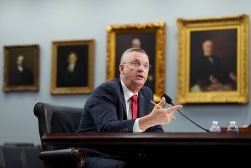Veterans CIO lives the brief life of a political appointee
LaVerne Council is hardly 100 days into her tenure as CIO of the Department of Veterans Affairs, but she’s already planning for the day she’ll leave.
A political appointee, Council knows only too well that she will likely be ushered out — along with President Barack Obama and the rest of his administration — when a new president takes office in 2017. And that’s made developing her strategy for VA’s Office of Information and Technology and its $4 billion budget much harder.
“When I’m thinking about the opportunities and what I can do for this organization, I’m consistently thinking about what happens when I’m no longer here,” Council told FedScoop in an interview. “And it’s very important to me that I leave the organization better than I found it and able to run without somebody in the office, because it could take a minute” to find a replacement.
In her previous roles as CIO of Johnson & Johnson and global vice president for information technology at Dell, Council had time to lay a foundation for her leadership, to provide solid ground on which the organizations’ IT initiatives could thrive once she was gone. Council said she “had no real drive to be in government,” but was drawn by the VA mission — “To care for him who shall have borne the battle…,” as President Abraham Lincoln declared in his second inaugural address announcing the creation of the department.
“You really need a core three or four years to get your organization humming and to be able to get the culture aligned, and the hearts and the minds aligned,” she said. “Because when that happens, IT does really create a wave of creativity, and a wave of change, and a wave of opportunity.”
But since being sworn in and joining OI&T July 6, Council has had to concentrate on setting VA up for success in a short time regardless of who replaces her. Typically, an appointee in her position would have a checklist of initiatives to engage in before the end of her short term, she said. VA is a complex department, though, rife with internal transformations and conflicts, like the overhaul of its highly criticized veteran’s services, especially in the aftermath of last year’s waitlist scandal at several VA hospitals in which a number of patients were not scheduled for care in a timely manner and died, allegedly as a result.
“The issue with that in an organization like this — the size and the complexity and the needs that it has — is you’re not really giving the organization a foundation and the alignment that it needs for the long term,” Council said. “I had to have a hard conversation with myself … I’ve got to do some heavy lifting and it can’t be about what I want to achieve, it’s got to be about the organization.”
Two of Council’s earliest focuses as CIO have been to develop strategies for the overall direction of IT in the department and its cybersecurity. During a May Senate committee hearing on her appointment, Council was already laying the foundation for a technology roadmap “that will enable Secretary [Bob] McDonald’s vision to provide excellent customer service to Veterans,” according to her prepared testimony.
That plan, officially the VA IT Strategic Plan, is now coming to fruition — Council plans to begin circulating it to senior VA staff this week.
Her Enterprise Cybersecurity Strategy, which FedScoop first reported on in August, is also ripening. A VA official told FedScoop the strategy was completed and sent to Congress Sept. 28, and the team behind it is now working on the implementation plan and timeline.
Council is optimistic about the plan and touted the praise it has received so far, particularly for its use of external partnerships — with the likes of the Department of Homeland Security, the Defense Department and the National Institute of Standards and Technology, to name a few — to bring in information security best practices and build that in to the fiber of the VA, something the department has lacked before as a victim of a massive breach discovered in 2006.
“It was done with the leadership of this organization and leaders from all over the country coming in and really focusing on security, even if they aren’t security folks, to come up with best overall solution and direction of strategy,” Council said. “At the end of the day, the U.S. government is the largest company in the world. So you have access to all kinds of things. Why wouldn’t we go out there and see what we have access to?”
‘Fail fast, move on’
Necessarily, given the time constraints put on Council’s service as CIO, she has elected to take a very rapid approach in her development of these initiatives. While the VA has long embraced the idea of agile technology development, more recently highlighted by the speed of the VA Digital Service team in its work to improve benefits claims processing and access to other veterans services, Council is expanding that approach throughout OI&T.
“One of the things I’ve been talking to the team about is not being afraid to fail. If you’re afraid to fail, you never put an idea out there,” she said.
“Fail fast, move on. Get over it — it’s not personal,” laughed Council.
To that end, she said her office plans to create an enterprise program management office because at the root of successful agile development — any technology development, really, she said — is strong planning and program management.
“You can’t underestimate the value of planning,” she said. “People talk about agile development like it’s the panacea. The panacea is a good plan. If you’ve got a good plan, the development takes no time. The outcome is pretty much understood. And you understand when you’re not going to make that outcome, and you can take a different direction or you can shut it down and move on to something else.”
And that planning brings her full circle to creating a legacy of IT excellence at VA that will last well beyond her appointment.
“I’ve really had to tax everything that I’ve known, everything that I’ve learned, to try to figure out what I can put here on a strategy that this team will be able to leverage for at least three years once I’m not here,” Council said. “The catch is it’s going to be heavily reliant on [career] senior leadership to own it, to be inspired by it and to understand this is their chance to show up regardless of who is in that office, cause it shouldn’t matter.”






